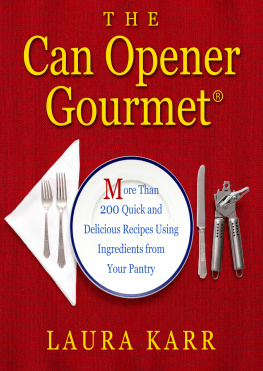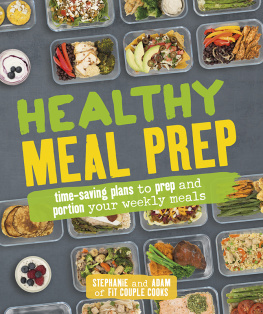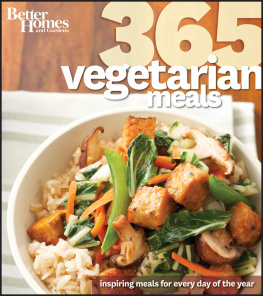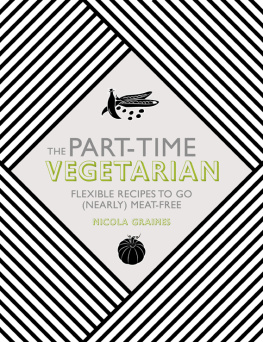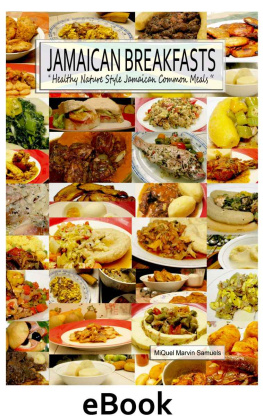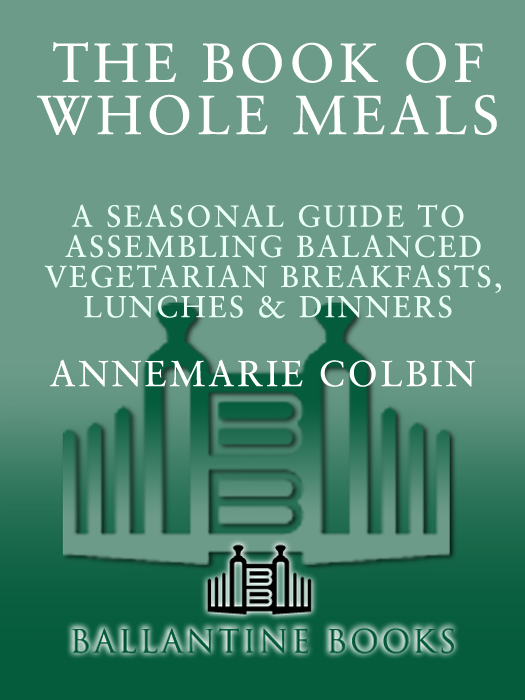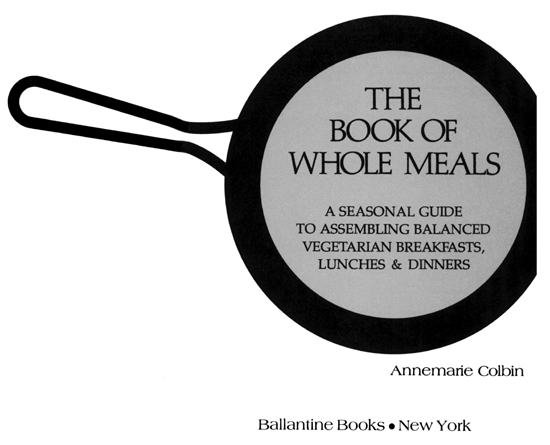Copyright 1979, 1983 by Annemarie Colbin
All rights reserved under International and Pan-American Copyright Conventions. Published in the United States by Ballantine Books, a division of Random House, Inc., New York, and simultaneously in Canada by Random House of Canada Limited, Toronto.
Library of Congress Catalog Card Number: 82-90850
eISBN: 978-0-307-83314-3
Originally published by Autumn Press, Inc.
Illustrated by Richard Spencer
v3.1
Table of Contents
Foreword
Dear Betty Crocker:
Ive had varicose veins since I was sixteen. I had two bouts of phlebitis before I was twenty-five. I took diuretics regularly, had almost constant pain and swelling in my legs. I couldnt do the things I enjoyedeven going to museums or on long walkswithout suffering. Almost immediately after eliminating sugar and white flour from my diet and switching to whole foods, the pain stopped. No more swelling, no more diuretics. No more allergies, colds, no illnesses in two years since I set fire to your cookbook. I never knew I could feel so good.
Does Betty Crocker ever get letters like that? I doubt it. But I do, every day in several languages. Always the same story. Name the disorder and Ill show you someone, somewhere, who got rid of it by switching to whole foods and cooking from scratch.
After I first learned to cook in Paris fifteen years ago, I couldnt wait to get back to Michigan to show off to my mother. While I demonstrated, she watched silently before announcing, Youre cooking exactly like my grandmother. When youre pushing 100, as she is, theres nothing new except whats been forgotten.
While reading this book in manuscript one evening, I got a very distressed call from a pretty young actress, loaded with talent and drive. But shed burdened herself with unmentionable disorders, including one that made auditions and casting calls an impossible ordeal. So I loaned her the manuscript to see what might happen. As if I didnt know. In two weeks I got a letter. Shed skipped the front of the book, copied out the grocery list, started shopping and chopping and cooking and chewing.
Now, she wrote, Im reading the first part to find out what happened. Youve changed my life. Not me, I told her. Not Annemarie either. You undid it yourself.
Anybody can.
William Dufty
New York City
Preface
There is a change of consciousness spreading around the country as fast as a fire through dried brush. It seems to be a shift in mental focus, and one of its most striking aspects is that that the analytical, matter-oriented approach to reality is slowly moving over to make room for its opposite: a focus on energy, whole organisms, and the recognition that the latter cannot be reduced to their parts and be accurately described by them only.
This emerging world view is one of synthesis: all of creation is seen as one vast web of interrelated, living, complex systems. However, these interrelationships are not haphazard, but endowed with what George Leonard, in The Silent Pulse (New York: E.P. Dutton, 1978), calls intentionalitythat is, a direction of movement, an unspoken agreement as to where to go. There seems to be an order to the universe, and we are not only part, but also co-creators of this order.
Each being, says Leonard, is the entire universe from a unique point of view, and its possible for all these universes to work together harmoniously. There are no chance events, since we are the architects of creation and all things are connected through us.
The new vision holds that, by virtue of being a co-creator of reality, each of us is also responsible for how his or her own reality unfolds. Thus, for example, the virus can no longer be blamed for being the cause of the disease; the sick person is equally responsible for it, having created an environment favorable to the development of the virus.
Once such responsiblity has been accepted, its only a short step to the idea of self-determination: we can, if we wish, change ourselves and our circumstances so as to move in whatever direction we want to go. With this attitude comes inner freedom, and the possibility of well-being, positive cooperation with others, and joy.
Quite appropriately, this new world view has picked up the name of holism. To fulfill the demands created by its rapid emergence, colleges are now setting up courses in holistic studies. Holistic health centers are springing up everywhere, like mushrooms after the rain. Lawyers are working to develop holistic law. After the phenomenal impact of Fritjof Capras The Tao of Physics, more and more physicists are interpreting their research into the nature of matter from a holistic viewpoint. Holistic education is being actively researched and implemented. In architecture, in business, in sports, the arts, and psychological therapies, the trend is now to consider the individual as a complex system inextricably related to its environment.
Although nutrition has been considered part of the holistic approach to health, there has been as yet no widespread consideration of a holistic approach to nutrition itself. This is precisely what I propose to explore in this book.
I encountered the concept that food is the cornerstone of health at the age of eleven, when I joined my family on a vegetable-broth fast. After that, I grew up mostly lacto-ovo-vegetarian, with occasional fish or chicken meals; although we were living in Argentina, our adoptive homeland, we only had meat once or twice a year. The eleven days I spent fasting changed my life: ever since then Ive been fascinated by the effect that food can have on body, mind, and spirit. I also like to understand how and why things work: if a certain way of eating makes me feel better than another, I want to know the reason. Hence, to satisfy my own curiosity, I spent much time studying food.
In 1964, a few years after I came to America, I began exploring and applying some of the ideas of a philosophy and dietary approach known as macrobiotics, which helped me understand many things about diet that had remained obscure. I cooked for my family, adapting recipes from my Dutch-Hungarian-Argentine background, and studied various theories of food and nutrition; eventually I began to teach what Id learned.
Through my cooking classes, Ive met many people who want to make healthful changes in their diet; Ive also met many who, intent upon developing a holistic view of life, are looking for a way to make that vision relevant to their daily living. For both types of seekers, the most pressing need seems to be a practical dietary approach (that is, something to do) coupled with a theory, based on understanding, that makes sense. For while ideas are useless unless they can be expressed in action, a technique lacks focus without a solid theoretical framework.
This theory/practice combination encourages our decision to accept responsibility for our lives, to support our self-determination, promote our well-being, and ultimately offers the possibility of a steadily joyful and positive outlook on life.
What youll find in this book is my experience of a mutually supporting theory and practice that accomplish just that. The focus is on food, simply because there is nothing more basic; food maintains life, sometimes well, sometimes not so well. And at this point in time, I can think of few activities that can have a more profound effect on a persons life than a conscious change in diet.


